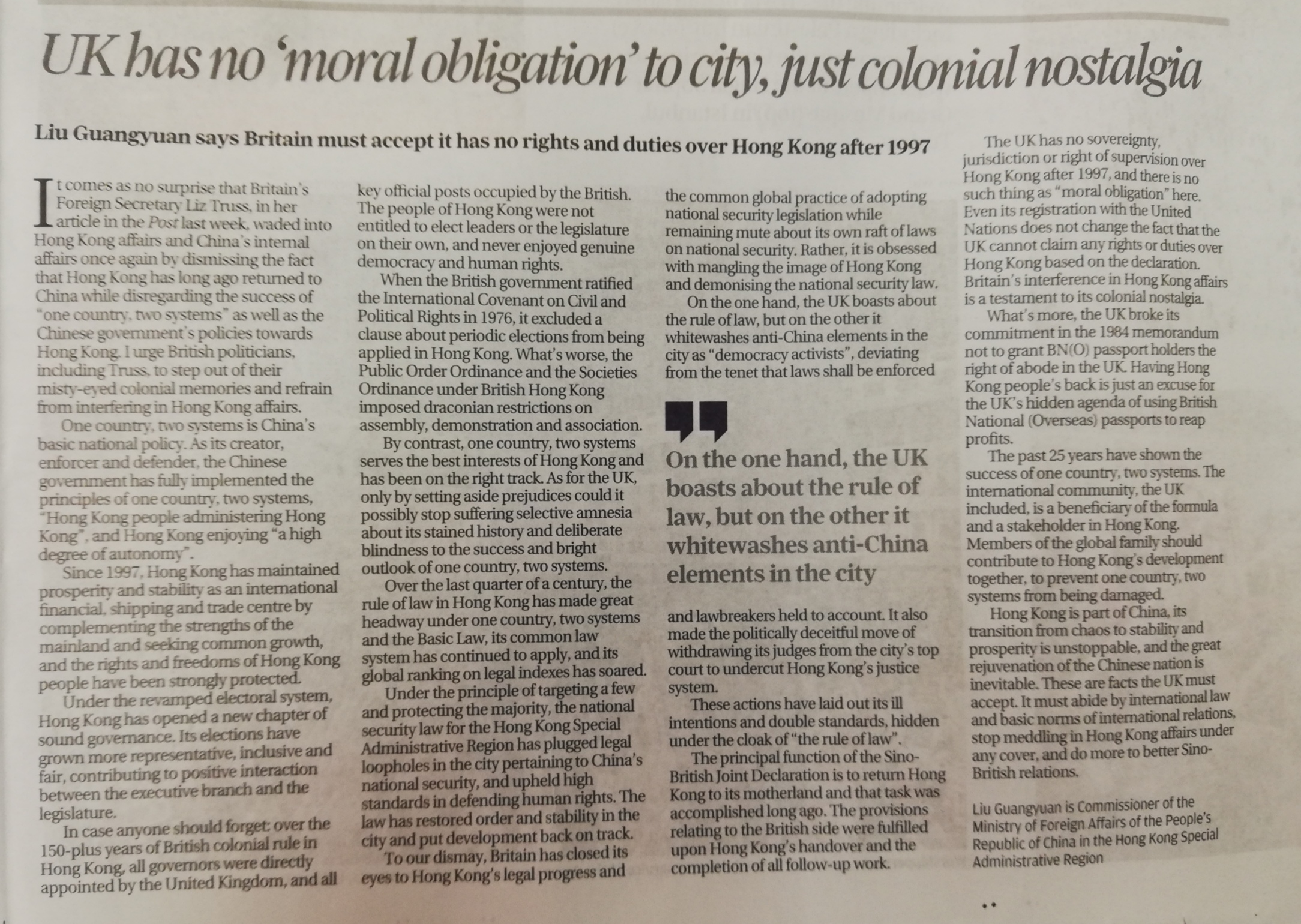2022年4月4日,外交部驻港公署刘光源特派员在《南华早报》发表题为《英国殖民旧梦可以休矣》的署名文章,严正驳斥英国外交发展大臣特拉斯日前在该报发表涉港错误言论,揭批英方罔顾事实,抱持双重标准和殖民心态,强调香港回归以来,“一国两制”取得举世公认的成功,敦促英方放弃殖民旧梦,停止以任何借口干预香港事务。文章当日亦在该报网页版刊登。全文如下:


英国殖民旧梦可以休矣
英国外交发展大臣特拉斯日前在《南华早报》撰文,罔顾香港早已回归中国的事实,诬蔑抹黑“一国两制”成功实践和中国政府对港政策,粗暴干预香港事务和中国内政。我要奉劝包括特拉斯女士在内的英国政客,放弃殖民旧梦,不要对香港事务说三道四、指手画脚。
“一国两制”是中国的基本国策。中国政府是“一国两制”事业的创立者、践行者和维护者,始终坚持“一国两制”、“港人治港”、高度自治方针。回归后,香港走上了同祖国内地优势互补、共同发展的宽广道路,香港持续保持繁荣稳定,国际金融、航运、贸易中心地位不断巩固,港人民主权利和自由得到充分保障。特区新选举制度落地后,选举的代表性、包容性、参与性、公平性充分显现,行政和立法机构形成良性互动,特区政治气象为之一新,治理效能不断提升,开启良政善治新篇章。
反观150多年英国对港殖民统治期间,港督从来都由英国直接委任,政府要职长期由英国人把持。港人无权自主选举产生领导人和立法机构,从未享有真正的民主与人权。英国政府在1976年批准《公民权利和政治权利国际公约》时通过保留的方式明确提出,公约有关选举的规定不在香港适用。港英时期的《公安条例》和《社团条例》更是对集会、游行、结社加以严苛限制。抚今追昔,“一国两制”实践一直沿着符合香港利益的轨道前进,英方只有放下偏见,才会对自身“黑历史”不再“选择性失忆”,才会对“一国两制”巨大成功实践和光明前景不再“选择性失明”。
香港回归以来,香港法治在“一国两制”和基本法框架下不断发展,香港普通法特色得以保持,法治指数国际排名大幅跃升。香港国安法终结了特区在维护国家安全方面长期不设防的历史,坚持“惩治极少数,保护大多数”,在尊重和保障人权上秉持高标准。香港国安法实施后,香港社会重归秩序和稳定,有力发挥“一法安香江”的积极效果。
英方无视香港法治发展成功实践,竭力破坏香港法治秩序和法治形象;无视国安立法是国际通例以及自身国安法律多、执法严的事实,对香港国安法持续污名化、妖魔化。英方标榜“法治”,却罔顾“有法必依,违法必究”的法治要义,将违法犯罪的反中乱港分子美化为“民主人士”,为其说项开脱。英方还假借撤回英籍法官搞政治操弄,以政治手法干预和破坏香港司法。英方上述行为暴露了“法治”外衣包藏下的真实祸心和双重标准,完全背离法治精神。
《中英联合声明》的核心要义是实现香港回归,这一历史使命已经完成。随着香港回归、过渡期工作的结束,《声明》中与英方有关的条款均已履行完毕。英国对回归后的香港无主权,无治权,无监督权,也不存在所谓“道义责任”。“《声明》在联合国登记”也改变不了英方无权再依据《声明》对香港提出任何权利义务主张的事实。英方动辄借《声明》干预香港事务,只能说明英方仍沉迷于抱残守缺的殖民心态。英方甚至不惜违背其在1984年备忘录中不赋予BNO护照持有者在英居留权等承诺,操弄殖民时代遗留的BNO身份问题,关心港人是假,借BNO坐收渔利是真。
香港回归近25年,“一国两制”取得举世公认的成功。包括英国在内的国际社会都是“一国两制”的受益者,是香港繁荣稳定的“持份者”,理应共同守护香港,而不是频繁上演各种政治操弄,干扰破坏“一国两制”。英方应认清香港早已回归中国,看清香港由乱及治、由治及兴的前进步伐不可阻挡,中华民族伟大复兴的历史大势不可逆转,恪守不干涉内政等国际公认的国际法和国际关系基本准则,停止以任何借口干预香港事务,多做有利于维护中英关系的事。
UK has no ‘moral obligation’ to city,just colonial nostalgia
It comes as no surprise that Britain’s Foreign Secretary Liz Truss, in her article in the Post last week, waded into Hong Kong affairs and China’s internal affairs once again by dismissing the fact that Hong Kong has long ago returned to China while disregarding the success of “one country, two systems” as well as the Chinese government’s policies towards Hong Kong. I urge British politicians, including Truss, to step out of their misty-eyed colonial memories and refrain from interfering in Hong Kong affairs.
One country, two systems is China’s basic national policy. As its creator, enforcer and defender, the Chinese government has fully and faithfully implemented the principles of one country, two systems, “Hong Kong people administering Hong Kong”, and Hong Kong enjoying “a high degree of autonomy”.
Since 1997, Hong Kong has maintained prosperity and stability as an international financial, shipping and trade centre by complementing the strengths of the mainland and seeking common growth, and the democratic rights and freedoms of Hong Kong people have been strongly protected.
Under the revamped electoral system, Hong Kong enjoys a fresh political climate and has opened a new chapter of sound governance. Its elections have grown more representative, inclusive and fair, contributing to positive interaction between the executive branch and the legislature.
In case anyone should forget: over the 150-plus years of British colonial rule in Hong Kong, all governors were directly appointed by the United Kingdom, and all key official posts occupied by the British. The people of Hong Kong were not entitled to elect leaders or the legislature on their own, and never enjoyed genuine democracy and human rights.
When the British government ratified the International Covenant on Civil and Political Rights in 1976, it explicitly excluded a clause about periodic elections from being applied in Hong Kong. What’s worse, the Public Order Ordinance and the Societies Ordinance under British Hong Kong imposed draconian restrictions on assembly, demonstration and association.
By contrast, one country, two systems serves the best interests of Hong Kong and has been on the right track. As for the UK, only by setting aside prejudices could it possibly stop suffering selective amnesia about its stained history and deliberate blindness to the success and bright outlook of one country, two systems.
Over the last quarter of a century, the rule of law in Hong Kong has made great headway under one country, two systems and the Basic Law, its common law system has continued to apply, and its global ranking on legal indexes has soared.
Under the principle of targeting a few and protecting the majority, the national security law for the Hong Kong Special Administrative Region has plugged legal loopholes in the city pertaining to China’s national security, and upheld high standards in respecting and defending human rights. The law has restored order and stability in the city and brought its development back on track.
To our dismay, Britain has closed its eyes to Hong Kong’s legal progress and the common global practice of adopting national security legislation while remaining mute about its own raft of laws involving national security. Rather, it is obsessed with mangling the image of Hong Kong and demonising the national security law.
On the one hand, the UK boasts about the rule of law, but on the other it whitewashes anti-China elements in Hong Kong as “democracy activists”, deviating from the tenet that laws shall be enforced and lawbreakers held to account. It also made the politically deceitful move of withdrawing its judges from Hong Kong’s top court to undercut Hong Kong’s justice system.
These actions have laid out its ill intentions and double standards, hidden under the cloak of “the rule of law”.
The principal function of the Sino-British Joint Declaration is to return Hong Kong to its motherland and that task was accomplished long ago. The provisions relating to the British side in the declaration were all fulfilled upon Hong Kong’s handover and the completion of all follow-up work.
The UK has no sovereignty, jurisdiction or right of supervision over Hong Kong after 1997, and there is no such thing as “moral obligation” here. Even its registration with the United Nations does not change the fact that the UK cannot claim any rights or duties over Hong Kong based on the declaration. Britain’s interference in Hong Kong affairs by citing the declaration is a testament to its colonial nostalgia.
What’s more, the UK broke its commitment in the 1984 memorandum not to grant BN(O) passport holders the right of abode in the UK, a manipulation of the issue left over from history. Having Hong Kong people’s back is just an excuse for the UK’s hidden agenda of using British National (Overseas) passports to reap profits.
The past 25 years have shown the success of one country, two systems. The international community, the UK included, is a beneficiary of the formula and a stakeholder in Hong Kong. Members of the global family should contribute to Hong Kong’s development together, to prevent one country, two systems from being damaged.
Hong Kong is part of China, its transition from chaos to stability and prosperity is unstoppable, and the great rejuvenation of the Chinese nation is inevitable. These are facts the UK must accept. It must abide by international law and basic norms of international relations, stop meddling in Hong Kong affairs under any cover, and do more to better Sino-British relations.